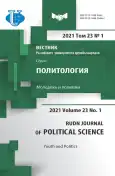Role of Institutional Environment in Shaping Political Careers of Young Political Leaders in the Regions of South-West Siberia
- Authors: Aseev S.Y.1, Shashkova Y.Y.1
-
Affiliations:
- Altai State University
- Issue: Vol 23, No 1 (2021): Youth and Politics
- Pages: 186-198
- Section: YOUTH IN POLITICS: A REGIONAL DIMENSION
- URL: https://journal-vniispk.ru/2313-1438/article/view/322141
- DOI: https://doi.org/10.22363/2313-1438-2021-23-1-186-198
- ID: 322141
Cite item
Full Text
Abstract
Evaluating prospects of bringing youth into Russian political elites has both an acuteness of a scientific challenge and practical relevance in the light of upcoming federal and regional elections of 2021. Based on the surveys of mass political consciousness of the youth and expert polls held in 2018-2020 in Altai Krai and Novosibirsk Oblast, the article has analyzed the visions of young people and their leaders on the effectiveness of career development through participation in youth political organizations, political parties and running for posts in election campaigns. Having measured these visions against the proportion of young people in the elite of the regional offices of political parties and in the lists of candidates running in regional elections, the authors have come to the conclusion about the low acceptance rate of career lift in regional political process. The object of the research comprises regions with different level of social and economic development, which has proved that lack of resource hinders realization of young leaders potential primarily in the regions with high concentration of economic capital and strong political competition.
About the authors
Sergey Yurievich Aseev
Altai State University
Author for correspondence.
Email: suass@mail.ru
PhD in Historical Science, Associate Professor of the Department of Political Science
Barnaul, Russian FederationYaroslava Yurievna Shashkova
Altai State University
Email: yashashkova@mail.ru
Doctor of Political Science, Head of the Department of Political Science
Barnaul, Russian FederationReferences
- Barsegyan, V. (2015). The intergenerational social mobility of young political activists. Journal of Sociology and Social Anthropology, 1, 179–190. (In Russian).
- Burtsev, S. A. (2018). Leadership discourse among the Russian young people: Potential of vertical social mobility. The Bulletin of the Adyghe State University, the series “Region Studies: Philosophy, History, Sociology, Jurisprudence, Political Sciences and Culturology”, 4(229), 103–111. (In Russian).
- Bystrova, A., Daugavet, A., Duka, A., Kolesnik, N., Nevskiy, A., & Tev, D. (2019). Institutionalization of the political elite: Sources of recruitment and career. Power and Elites, 6(2), 24–66. doi: 10.31119/pe.2019.6.2.2. (In Russian).
- Ekpe, I. (2017). Factors impacting on youth’s leadership participation in Malaysia: Social media, social groups or government policies? Polish Journal of Management Studies, 16(1), 21–31. doi: 10.17512/pjms.2017.16.1.02. (In Russian).
- Gaman-Golutvina, O. V. (2017). Policy as public administration, public administration as policy: Recruiting leaders and elites in contemporary world (Twenty-Ninth Gubernatorial Readings. Tyumen, June 6th, 2017). Politeia, 3, 154–180. doi: 10.30570/2078-5089-2017-86-3-154-180. (In Russian).
- Golobokov, A. S., & Tyugaev, A. R. (2017). Features and problems of the career of modern Russian youth. Azimuth of Scientific Research: Economics and Management, 6(2), 238–241. (In Russian).
- Kahne, J., & Middaugh, E. (2012). Digital media shapes youth participation in politics. Phi Delta Kappan, 94(3), 52–56. doi: 10.2307/41763677. (In Russian).
- Krasavina, E. V. (2013). Narrowing the channels of vertical mobility as a factor in the spread of imitation strategies among young people. Scientific Thought of the Caucasus, 2, 46–50. (In Russian).
- Lagutin, O. V. (2013). Features of political careers in the executive and legislative power at the regional level. Political Expertise: POLITEX, 1, 99–115. (In Russian).
- Lagutin, O. V. (2014). Factors of the formation of career models of the regional administrative-political elite. Political Expertise: POLITEX, 3, 63–78. (In Russian).
- Martinez, M. L., Loyola, L. I., & Cumsille, P. (2017). Quality of participation in youth organizations: Relationships with identity and sense of sociopolitical control. Youth & Society, 49(7), 968–993. doi: 10.1177/0044118X15604341. (In Russian).
- Oc, B., & Bashshur, M. R. (2013). Followership, leadership and social influence. The Leadership Quarterly, 24(6), 919–934. doi: 10.1016/j.leaqua.2013.10.006. (In Russian).
- Popova, O. V. (2013). Career strategies of subfederal political elites. Vestnik of Saint Petersburg University. Political Science. International Relations, 1, 49–56. (In Russian).
- Popova, O. V., & Lagutin, O. V. (2019). Political views of the youth: loyalty or protest? RUDN Journal of Political Science, 21(4), 599–619. doi: 10.22363/2313-1438-2019-21-4-599-619. (In Russian).
- Rimsky, V. L. (2013). Social institutions and practices that determine political careers in the regions and municipalities of modern Russia. Political Expertise: POLITEX, 1, 52–72. (In Russian).
- Ryzhkov, S. I. (2018). Political career of a young provincial. Alley of Science, 3, 120–125. (In Russian).
- Sharapov, A. V. (2011). Electoral activity of youth in the 2000s in the Altai Territory. Tambov University Review. Series: Humanities, 8(100), 248–252. (In Russian).
- Shentyakova, A. V. (2014). Motivation and career building strategies for representatives of the regional elite. Vestnik of Saint Petersburg University. Series 6. Philosophy. Culturology. Political Science. Law. International Relationships, 2, 111–119. (In Russian).
- Shentyakova, A. V. (2015). Permeability of recruitment channels into the political elite. Vestnik of Saint Petersburg University. Political Science. International Relations, 3, 46–56. (In Russian).
- Sushko, P. E. (2018). Features of career strategies of politically active youth in modern Russia. Theory and Practice of Social Development, 2, 9–13. (In Russian).
Supplementary files









